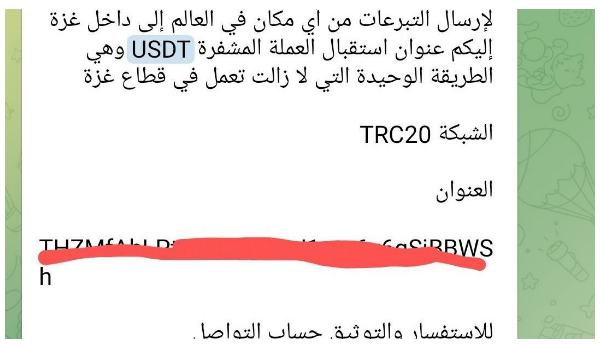Jihadist groups such as Al Qaeda and Islamic State, along with their sympathizers, are taking advantage of the anger and hostility among Muslims towards Israel’s actions in Gaza to raise funds through crowdfunding campaigns. These groups are using digital currencies like Tether and Bitcoin, as well as decentralized crypto exchange platforms, to launder the funds. The use of these cryptocurrencies by militant jihadists has come under scrutiny following the Hamas attack on Israel in October.
Monitoring by the International Center for the Study of Violent Extremism (ICSVE) suggests that Islamic State and Al Qaeda-linked entities are exploiting the Israeli-Hamas conflict to boost their crowdfunding efforts. Some pro-Al Qaeda groups claim to provide financial assistance to Palestinians in Gaza through cryptocurrency proceeds.
While legitimate resources are being directed to victims, illicit resources are also flowing to militants. It is important to note that Hamas leaders rejected calls from Al Qaeda leaders in 2005 to boycott elections and join global jihad. However, there are indications that Hamas may be aligning itself with global jihadists as Israeli governance moves further to the right and desperation in Gaza grows.
Militant groups claim to raise money for Palestinians, but it is unclear if these claims are genuine. An Al Qaeda supporter advises caution when donating to Gaza-related fundraisers, suggesting that donors ask for proof of how the funds are being used.
Terrorist groups have a history of exploiting political turmoil and conflicts to further their financial gains. In March 2023, ICSVE documented Islamic State in Pakistan province raising funds for earthquake victims in Syria through cryptocurrencies like Ethereum, Monero, and USDT.
A crowdfunding initiative called “Strive with your Money” has gained momentum, claiming to be run by an independent jihadist ideologue and former member of Hayat Taharir Al Sham. The campaign has reportedly collected $500,000 in Tether donations and fiat currency primarily from Central Asia and Russia.
Hamas has suspended bitcoin donations due to security concerns and crackdowns by the US Treasury and Israeli government. Crowdfunding campaigns like these provide a facade of humanitarian aid while potentially facilitating illicit financing for militant groups.
Jihadist groups have shifted their preference from Bitcoin to the Tron network (TRC20) for crypto transfers. Tether, a currency on the Tron blockchain, has become the preferred currency for militant groups due to its rapid transfers, low transaction fees, and user-friendly protocol. Criminal and terrorist entities exploit Tron’s anonymity and fast transaction speeds to obfuscate the origins and destinations of illicit funds.
Privacy-oriented cryptocurrencies like Monero and Zcash are also being used by jihadist groups for secure money transfers. Mixing services that pool multiple crypto transactions together to hide the transaction trail have become a preferred technique for terrorist groups.
Mainstream centralized exchanges, such as Binance, have been the biggest recipients of illicit cryptocurrency funds. These exchanges have faced fines for violating anti-money laundering rules and are under scrutiny for their role in facilitating money laundering for terrorist groups.
Jihadist groups are increasingly interested in crypto mining for illicit financing and profitability. They have also discussed the permissibility of using virtual currencies under Sharia law.
The adaptability and sophistication of jihadist groups in utilizing virtual assets present a challenge for law enforcement in tracking and disrupting terrorist-linked illicit financial networks. There is an urgent need for systematic monitoring of crowdfunding campaigns and other fundraising efforts by militant groups to combat cryptocurrency-enabled terrorism financing.



